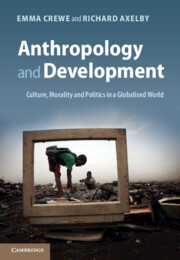Book contents
- Frontmatter
- Contents
- List of acronyms
- Preface and acknowledgements
- 1 Introduction
- 2 Anthropologists engaged
- 3 The social and political organisation of aid and development
- 4 The elusive poor
- 5 Human rights and cultural fantasies
- 6 Hierarchies of knowledge
- 7 The moralities of production and exchange
- 8 The politics of policy and practice
- 9 Imagining the future
- Appendix: challenging questions arising from this book
- Notes
- References
- Index
6 - Hierarchies of knowledge
Published online by Cambridge University Press: 05 November 2012
- Frontmatter
- Contents
- List of acronyms
- Preface and acknowledgements
- 1 Introduction
- 2 Anthropologists engaged
- 3 The social and political organisation of aid and development
- 4 The elusive poor
- 5 Human rights and cultural fantasies
- 6 Hierarchies of knowledge
- 7 The moralities of production and exchange
- 8 The politics of policy and practice
- 9 Imagining the future
- Appendix: challenging questions arising from this book
- Notes
- References
- Index
Summary
The creation and application of new ideas and technologies entail complex and open-ended processes. Anthropologists probe how the production, use and evaluation of technology are socially situated. This means critically examining the cultural meanings that attach to varied knowledge forms, the social systems within which they are embedded and the impacts that new technologies have upon constellations of social relations. In short, since technology is never value-free or neutral, it is highly likely to have significant political and economic consequences shaped by varied local settings.
Key points covered by this chapter
Within the many cultures that exist within the development industry value judgements are made about knowledge and technology.
We consider: What is technology? What is the relationship between technology and society? How does culture influence technological innovation? And how does technological development influence culture? What role does technology play in development?
In contrast to the technological determinism of mainstream science, anthropology recognises all forms of knowledge and technology as being embedded in social systems.
As a challenge to the ethnocentrism of many orthodox approaches, anthropological perspectives see knowledge as being contested, recognise and respect its many different forms and promote hybridity.
Some anthropologists working in development aim to assess local needs and resources and ensure that externally originating technology responds to each context. Others critique the way that political processes are seen as knowledge deficit problems requiring technical solutions.
In Development World we find that science, and its applications through technology, have been treated as being the bedrock of progress. If low levels of development are identified by the presence of poverty, hunger or disease, then certain forms of scientific knowledge and advanced technology can symbolically represent a higher level of development. They are also a large part of the means by which it may be achieved; science has been seen as synonymous with, or at least required for, technological advancement and human progress. In some contexts and agencies development is even understood as the appliance to human society and government of the scientific principles of rationality, empiricism and enlightenment. And central to the development project of modernisation is the practical application of scientific knowledge in the form of technology.
- Type
- Chapter
- Information
- Anthropology and DevelopmentCulture, Morality and Politics in a Globalised World, pp. 131 - 156Publisher: Cambridge University PressPrint publication year: 2012
- 1
- Cited by



